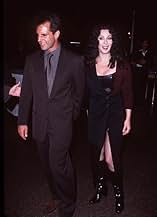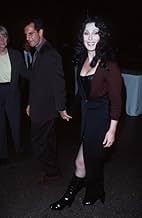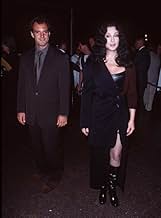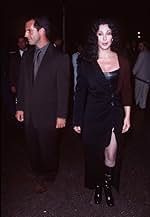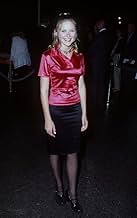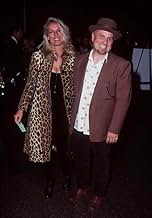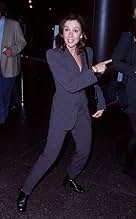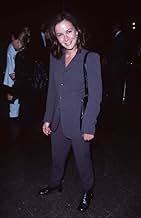PUNTUACIÓN EN IMDb
6,9/10
5,3 mil
TU PUNTUACIÓN
Añade un argumento en tu idiomaThe movie examines the abortion issue through three stories set in different eras: 1952, 1974 and 1996.The movie examines the abortion issue through three stories set in different eras: 1952, 1974 and 1996.The movie examines the abortion issue through three stories set in different eras: 1952, 1974 and 1996.
- Dirección
- Guión
- Reparto principal
- Nominado para 4 premios Primetime Emmy
- 4 premios y 15 nominaciones en total
Bob Shuttleworth
- Hospital Visitor (segment "1952")
- (as Bob Shuttlesworth)
Reseñas destacadas
If you ever thought a woman's right to choose was an easy one, this will take care of that. Unexpected pregnancy can be from carelessness of course, but it can also be from fallible birth control, boyfriends who lie, and people you were with against your will. This is three distinct movies in one on the same topic of a woman trying to chose to have, or not have, an unexpected baby. Each one is set in a different decade.
I had to turn the volume down and close my eyes at times. Not for gruesomeness but the way you close your eyes when someone is about to hit that awful note in the Star Spangled Banner. You feel the pain of their attempt at something difficult. You don't just watch this movie, you feel it.
Men are not portrayed as multi-dimentional as the women are, but they are not the villian either. They are included yet they can never fully understand. You see the suffering the women go through in their own head, how difficult it is, the wavering in their decisions. They have equal fear of having an abortion, having a baby, and having the people around them know of their predicament.
I had to turn the volume down and close my eyes at times. Not for gruesomeness but the way you close your eyes when someone is about to hit that awful note in the Star Spangled Banner. You feel the pain of their attempt at something difficult. You don't just watch this movie, you feel it.
Men are not portrayed as multi-dimentional as the women are, but they are not the villian either. They are included yet they can never fully understand. You see the suffering the women go through in their own head, how difficult it is, the wavering in their decisions. They have equal fear of having an abortion, having a baby, and having the people around them know of their predicament.
This film shows up as well now as I did when I first saw it in 1996 and was amazed. All those in the "demi moore can't act" camp should check out what she can do with the right material. She delivers an amazing performance in the first piece, giving those of us who dont remember a glimpse of the pre-Roe v Wade situation for women who found themselves in a less than desirable situation. Sissy Spacek is brilliant as ever in a lighter, though heartfelt and often ignored situation of a mom deciding whether one more child is what she wants. The final segment knocks me off my feet. Kudos to Cher for pulling together great actors and great stories.
Demi Moore, Sissy Spacek and Anne Heche play three very different women from different eras (the 1950's, 1970's and 1990's respectively) who are each confronted with the same dilemma. They're pregnant, and struggling with whether or not to end the pregnancy, with each story being set against the value system of the day. The stories are unrelated in any other way, but together they represent an interesting evolution of thoughts around the abortion issue.
Moore's performance is probably the one that brings forth the greatest feelings of sympathy from the viewer. She's a nurse and a young widow, alone and lonely except for the connection to her deceased husband's family, who has to find a way to deal with a pregnancy that was unplanned and the result of a one-time "fling" with her brother in law. Abortion is illegal, she has to avoid shaming her "family," and she can't just disappear for nine months to give birth because she has a job and little money. In the end she finds a shady abortion provider who does the deed on her kitchen table, and leaves her in a desperate condition - her fate remaining a mystery. This was the most powerful of the stories. Heche's character has an affair with an older, married man who wants nothing to do with the responsibility. She chooses abortion after a lot of soul-searching, but while it's legal in the 90's she's confronted by pro-life protesters at the door of the clinic who do cause her to think twice about the decision, although she ultimately goes ahead with it. With a best friend who's pro-life but supportive of her she goes falls into a scene of horror that seemed to me too expected and contrived. The soul-searching the character goes through, though, makes this a worthwhile vignette. The weakest of the three stories was probably that featuring Spacek. She's a mother of three in a happy marriage and re-starting her own education when she becomes pregnant again. This story revolves mostly around tensions within the family as all consider the potential impact of the pregnancy on their hopes and dreams. In the end, this pregnancy continues.
It was interesting to see the perspective on the issue from three very different generations.
Moore's performance is probably the one that brings forth the greatest feelings of sympathy from the viewer. She's a nurse and a young widow, alone and lonely except for the connection to her deceased husband's family, who has to find a way to deal with a pregnancy that was unplanned and the result of a one-time "fling" with her brother in law. Abortion is illegal, she has to avoid shaming her "family," and she can't just disappear for nine months to give birth because she has a job and little money. In the end she finds a shady abortion provider who does the deed on her kitchen table, and leaves her in a desperate condition - her fate remaining a mystery. This was the most powerful of the stories. Heche's character has an affair with an older, married man who wants nothing to do with the responsibility. She chooses abortion after a lot of soul-searching, but while it's legal in the 90's she's confronted by pro-life protesters at the door of the clinic who do cause her to think twice about the decision, although she ultimately goes ahead with it. With a best friend who's pro-life but supportive of her she goes falls into a scene of horror that seemed to me too expected and contrived. The soul-searching the character goes through, though, makes this a worthwhile vignette. The weakest of the three stories was probably that featuring Spacek. She's a mother of three in a happy marriage and re-starting her own education when she becomes pregnant again. This story revolves mostly around tensions within the family as all consider the potential impact of the pregnancy on their hopes and dreams. In the end, this pregnancy continues.
It was interesting to see the perspective on the issue from three very different generations.
Review: I quite enjoyed this deep, emotional drama which is set from the 50's to the 90's about 3 different women, Demi Moore, Sissy Spacek and Anne Heche, who all have problems concerning abortion. The first story, which stars Demi Mooore, is the most emotional out of the 3 because it was illegal to have an abortion during the 50's. Demi Moore's performance was brilliant and extremely real. It's a shame that you don't see the outcome of the first story, but it a very well written storyline that will definitely touch the heart. The second story, which is based in the 70's is starring Sissy Spacek as a house wife and a mother of 4 who struggles to have any time for herself because of her hectic lifestyle. When she finds out that she is pregnant, she has to make the difficult decision if to keep or abort the baby. This is another powerful drama that was very well made. The acting by all of the cast was great, along with the storyline which was also, emotional. The third an final storyline which is set in the 90's is starring Anne Heche as teenager who gets pregnant by a married man. She also has to make the decision if to keep or abort the baby, but she gets help from her close friend Jada Pinkett Smith, and the nurses at the clinic. This was also an emotional piece, which stars Cher as a nurse. In all, the whole movie is a right eye opener that was a great watch. Emotional!
Round-Up: This movie came out when Demi Moore and Cher were in the spotlight and extremely popular. As this movie was an HBO special, it didn't get a major release in the cinemas, but it was talked about at the time. Personally, I hadn't heard of the movie, but I'm glad that I added it to my rental list because it was a great watch. The fact that the whole film is based around the same house was cleverly done by the director and the delicate subject matter was dealt with in a sympathetic and thoughtful way. Although the movie came out in the 90's, it doesn't seem dated or out of touch with matters of this day and age which is why it's worth watching.
I recommend this movie to people who are into there extremely emotional dramas about 3 stories based on abortion which takes place over the years in the same house. 7/10
Round-Up: This movie came out when Demi Moore and Cher were in the spotlight and extremely popular. As this movie was an HBO special, it didn't get a major release in the cinemas, but it was talked about at the time. Personally, I hadn't heard of the movie, but I'm glad that I added it to my rental list because it was a great watch. The fact that the whole film is based around the same house was cleverly done by the director and the delicate subject matter was dealt with in a sympathetic and thoughtful way. Although the movie came out in the 90's, it doesn't seem dated or out of touch with matters of this day and age which is why it's worth watching.
I recommend this movie to people who are into there extremely emotional dramas about 3 stories based on abortion which takes place over the years in the same house. 7/10
I have just seen 'If These Walls Could Talk' for the first time, and I am completely in awe. This film should be mandatory viewing material for any person who thinks that abortion is an easy choice or that women faced with an unplanned pregnancy should have their right to choose taken away from them.
Sissy Spacek did a wonderful job portraying the most overlooked unplanned pregnancy demographic: the aging career mother who must choose whether or not to make the sacrifice of raising another child. In this story I truly appreciated the message that choosing to have a child is also pro-choice. Anne Heche's role in the final story was the most 'typical' of the three: the single college student who must struggle with her own moral and personal issues when making a choice about her pregnancy. While she portrayed the most common demographic of women who face an unplanned pregnancy, her role was beautifully and honestly acted. But the most riveting and heartbreaking of the three stories featured Demi Moore as a young widow who must make the hardest decision in her life-- to risk not only her career and reputation but the relationship of her in-laws who have taken her in as one of their own by carrying to term the baby of her dead husband's brother, or to risk her life by choosing what was once a barbaric and incredibly dangerous procedure due to the illegality of abortion. Her struggle is disturbing, and any woman who remembers the dark days before Roe v. Wade will feel her character's pain, fear, and especially her desperation. This story in particular showcases why keeping abortion safe and legal is so very necessary.
What struck me most about this film was not only the realism in all three situations, but how each one of the stories showed that "Pro-Choice" is not always "Pro-Abortion"; a fact that those of us who support a woman's right to chose will be all too glad to point out while those of the stauncher anti-choice fold may be a little slow to admit. The struggle that each woman faces in this film is unique, and while another reviewer mistakenly commented that each instance was merely 'cliché', I will argue that each instance was REAL. Rape and incest are not the causes for most unplanned pregnancies, and a great number of women who choose abortion are of legal age to do so. This film would have been 'cliché' if every actor had portrayed a low-income person of color, which is clearly unrealistic. And while violence against abortion providers isn't an every day occurrence, there are people in our society who wish that were the case-- and including this scene in the film shows us, in graphic detail, the hypocrisy of that opinion.
I was surprised that this film, especially the final story, didn't tackle other reproductive choice-related issues such as birth control. However, I was extremely pleased with how the final story educated viewers on the realities of the abortion procedure (mandatory counseling and all)-- a reality which couldn't be further from the horrific depictions offered up by many in the anti-choice camp. Speaking of which: I was grateful for this film showing that not all people who oppose abortion are stereotypical, out of control lunatics, but that the most radical in this faction tend to be, ironically, male. And one comment made by a character regarding adoption truly hit home for me as I once worked in a residential facility for abandoned and abused children that was, like so many others in this country, bursting at the seams: "The last time I checked, there wasn't a shortage of little black babies".
This film needs to be aired during prime time and piped into the Bush White House, if for no other reason than to show that abortion is not a black and white issue, that the argument surrounding it cannot be settled through protest, violence or prohibition, and that restricting a woman's legal right to reproductive choice will only complicate matters further but will not be an end to abortion. Anyone who has ever been faced with an unplanned pregnancy will agree, and anyone who hasn't will learn that their opinion can be subject to change depending on their circumstances.
Sissy Spacek did a wonderful job portraying the most overlooked unplanned pregnancy demographic: the aging career mother who must choose whether or not to make the sacrifice of raising another child. In this story I truly appreciated the message that choosing to have a child is also pro-choice. Anne Heche's role in the final story was the most 'typical' of the three: the single college student who must struggle with her own moral and personal issues when making a choice about her pregnancy. While she portrayed the most common demographic of women who face an unplanned pregnancy, her role was beautifully and honestly acted. But the most riveting and heartbreaking of the three stories featured Demi Moore as a young widow who must make the hardest decision in her life-- to risk not only her career and reputation but the relationship of her in-laws who have taken her in as one of their own by carrying to term the baby of her dead husband's brother, or to risk her life by choosing what was once a barbaric and incredibly dangerous procedure due to the illegality of abortion. Her struggle is disturbing, and any woman who remembers the dark days before Roe v. Wade will feel her character's pain, fear, and especially her desperation. This story in particular showcases why keeping abortion safe and legal is so very necessary.
What struck me most about this film was not only the realism in all three situations, but how each one of the stories showed that "Pro-Choice" is not always "Pro-Abortion"; a fact that those of us who support a woman's right to chose will be all too glad to point out while those of the stauncher anti-choice fold may be a little slow to admit. The struggle that each woman faces in this film is unique, and while another reviewer mistakenly commented that each instance was merely 'cliché', I will argue that each instance was REAL. Rape and incest are not the causes for most unplanned pregnancies, and a great number of women who choose abortion are of legal age to do so. This film would have been 'cliché' if every actor had portrayed a low-income person of color, which is clearly unrealistic. And while violence against abortion providers isn't an every day occurrence, there are people in our society who wish that were the case-- and including this scene in the film shows us, in graphic detail, the hypocrisy of that opinion.
I was surprised that this film, especially the final story, didn't tackle other reproductive choice-related issues such as birth control. However, I was extremely pleased with how the final story educated viewers on the realities of the abortion procedure (mandatory counseling and all)-- a reality which couldn't be further from the horrific depictions offered up by many in the anti-choice camp. Speaking of which: I was grateful for this film showing that not all people who oppose abortion are stereotypical, out of control lunatics, but that the most radical in this faction tend to be, ironically, male. And one comment made by a character regarding adoption truly hit home for me as I once worked in a residential facility for abandoned and abused children that was, like so many others in this country, bursting at the seams: "The last time I checked, there wasn't a shortage of little black babies".
This film needs to be aired during prime time and piped into the Bush White House, if for no other reason than to show that abortion is not a black and white issue, that the argument surrounding it cannot be settled through protest, violence or prohibition, and that restricting a woman's legal right to reproductive choice will only complicate matters further but will not be an end to abortion. Anyone who has ever been faced with an unplanned pregnancy will agree, and anyone who hasn't will learn that their opinion can be subject to change depending on their circumstances.
¿Sabías que...?
- CuriosidadesHolds the record as HBO's highest-rated original movie.
- PifiasIn the 1974 segment, one of the kids mentions wanting to watch The Partridge Family (1970), which at that time, aired on Saturday night. However, the kids had been to school that day so it was not a Saturday.
- Citas
Patti (segment "1996"): You get this abortion and I swear to you, you are on your own.
- Versiones alternativasThe UK video version was cut by 3 secs to reduce multiple gunshots during the hospital shooting scene.
- Banda sonoraCrazy
Written and Performed by Seal
Selecciones populares
Inicia sesión para calificar y añadir a tu lista para recibir recomendaciones personalizadas
Detalles
- Duración1 hora 37 minutos
- Color
- Mezcla de sonido
- Relación de aspecto
- 1.33 : 1
Contribuir a esta página
Sugerir un cambio o añadir el contenido que falta

Principal laguna de datos
By what name was Si las paredes hablasen (1996) officially released in Canada in English?
Responde
